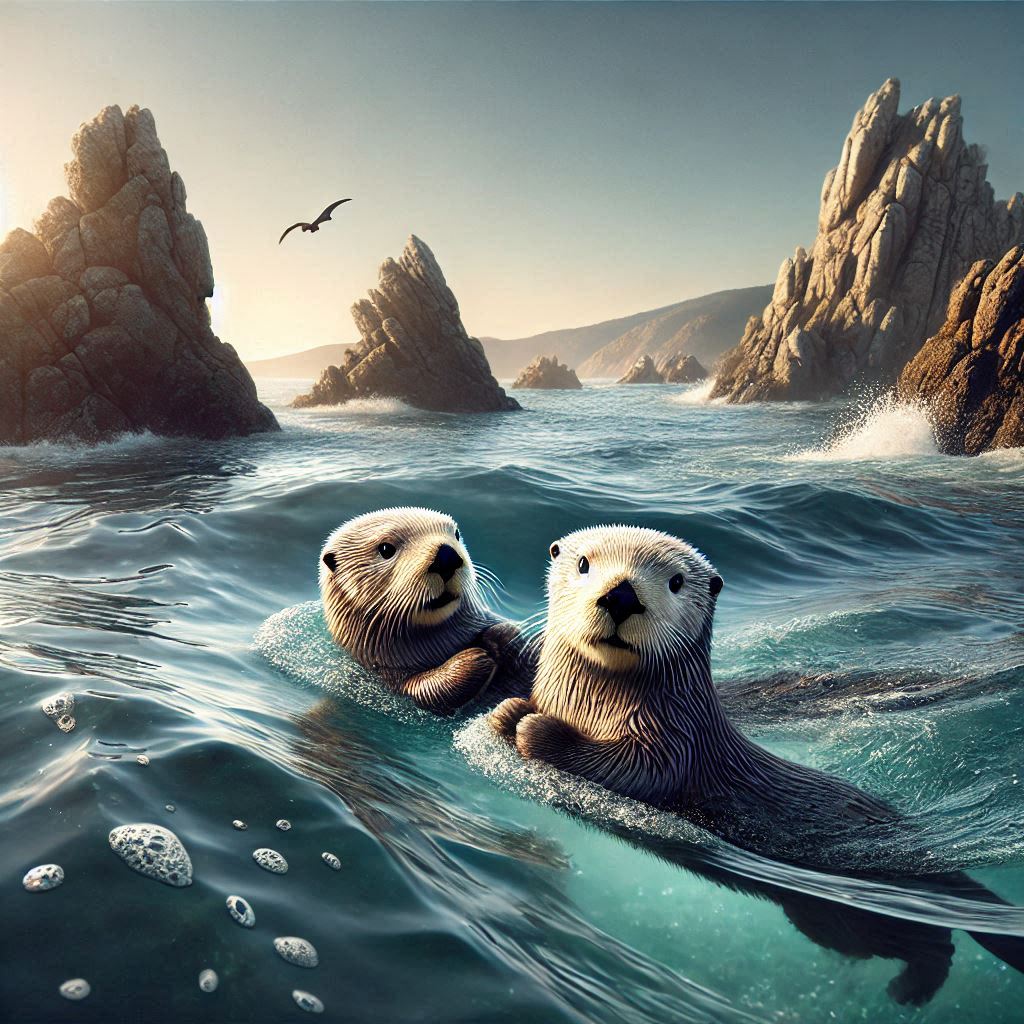Lutraphobia
Fear of Otters
Jump to the Article

Lutraphobia, the fear of otters, might seem like a whimsical concept. After all, who wouldn't want to cuddle with a playful otter? But for some, the thought of these adorable creatures can induce anxiety, from mild unease to full-blown panic. Perhaps their slippery agility, mischievous glint in the eye, or that unsettlingly long reach sets off the alarm bells. Whatever the cause, Lutraphobia is a stark reminder that even the most endearing creatures can hold hidden (and perhaps slightly irrational) terrors for some, a fear that many of us can relate to in our own unique ways.
Otters captivate the human imagination with their playful antics and endearingly mischievous expressions. These aquatic mammals are not merely charming creatures; they play a vital role in maintaining the health of aquatic ecosystems. However, their history is intertwined with a period of near-extinction due to the relentless pursuit of their luxurious pelts.
Sea otters, in particular, faced a dire fate during the 18th and 19th centuries. Their thick, dense fur was highly prized, driving a lucrative fur trade that pushed them to the brink of extinction along the Pacific Coast. Fortunately, conservation efforts have helped many otter populations rebound, though the threat of human activities still looms.
Intelligence is a hallmark of otter species. They exhibit remarkable problem-solving abilities, demonstrating a sophisticated understanding of their environment. For instance, sea otters are known to use rocks as tools to crack open shellfish, showcasing their ingenuity and adaptability.
Playfulness is the otters' defining characteristic. They engage in various playful behaviors, including sliding down muddy banks, wrestling with each other, and chasing each other through water. These playful interactions not only provide entertainment but also serve important social and developmental functions.
Otters typically form strong family bonds. Mothers are devoted to their young, providing them with extensive care and protection. While mating systems vary among species, many exhibit monogamous tendencies, at least during the breeding season.
The life span varies depending on the species but generally ranges from 10 to 15 years in the wild. Their diet primarily consists of fish, crustaceans, and mollusks, making them important predators in aquatic food webs.
Despite conservation efforts, otters continue to face various threats. Habitat loss due to human development, pollution, and climate change pose significant challenges. Entanglement in fishing gear and collisions with boats also contribute to otter mortality.
Otters' environmental impact is generally positive. As apex predators, they help regulate prey populations, maintaining a healthy balance within the ecosystem. By consuming prey species, they also contribute to nutrient cycling and the overall health of aquatic habitats.
Lutraphobia, the fear of otters, may seem unusual given their generally endearing nature. However, for some individuals, the sight or even the thought of otters can trigger anxiety. While the exact causes of Lutraphobia are not fully understood, it may stem from a fear of the unknown, a perceived threat, or a past negative experience.
Overcoming Lutraphobia may involve a multi-faceted approach. Cognitive-behavioral therapy can help individuals identify and challenge irrational fears. Exposure therapy can also be beneficial by gradually introducing the individual to otter-related stimuli in a controlled environment. Seeking support from a therapist or counselor specializing in phobias can provide valuable guidance and support throughout the recovery process.
In conclusion, otters are fascinating creatures that are crucial in their respective ecosystems. Understanding their behavior, appreciating their ecological importance, and addressing their challenges are essential for their continued survival. By fostering a deeper connection with these remarkable animals, we can ensure their continued presence in the world for generations to come.
Sources
- "Otters: Cute, Playful, Geniuses?" - Rocky Mountain PBS. Accessed December 30, 2024.
- "Sea Otters Are Unlikely Helpers in Our Fight Against Climate Change" by Leah Schrodt. U.S. Fish and Wildlife Service. Accessed December 30, 2024.
- "Southern Sea Otter" - Marine Mammal Commission. Accessed December 30, 2024.
- "12 Facts About Otters for Sea Otter Awareness Week" - U.S. Department of the Interior. Accessed December 30, 2024.
- "Thinking Like an Ocean" - U.S. Fish and Wildlife Service. Accessed December 30, 2024.
- "How Sea Otters Can Help Save the Planet" - Marine Mammal Center. Accessed December 30, 2024.
- "10 Life-Changing Lessons from Otters: Unleashing Playfulness and Success" - Otter Learning. Accessed December 30, 2024.
- "Sea otters use tools when feeding to survive a changing world" by Mike Peña. UC Santa Cruz. Accessed December 30, 2024.
- "North American River Otter" - National Wildlife Federation. Accessed December 30, 2024.
- "Sea Otter Society: The Single Moms' Club" by Claire Mayer and Gena Bentall. Sea Otter Savvy. Accessed December 30, 2024.
- "Otter Diet Facts You Otter Know" - SeaWorld San Diego. Accessed December 30, 2024.
- "Sea Otter" - Defenders of Wildlife. Accessed December 30, 2024.
- "Trade And Threats" - International Otter Survival Fund. Accessed December 30, 2024.
- "Boating and Sea Otters: No Wake for Otters' Sake" by Colleen Young and Gena Bentall. Sea Otter Savvy. Accessed December 30, 2024.
- "How sea otters fight climate change by guarding kelp forests" by Lindsey Jean Schueman. One Earth. Accessed December 30, 2024.
- "The Fear Factor: Phobias" by Heather Hatfield. WebMD. Accessed December 30, 2024.
- "Specific Phobia Treatment: Cognitive Behavioral Therapy (CBT)" - . Los Angeles Cognitive Behavioral Therapy. Accessed December 30, 2024.
